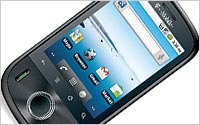 A new Yankee Group report doesn't hold much hope for Microsoft and Nokia’s combined effort to get back in the smartphone race this
year. The study concluded that any smartphone platform with less than 20% market share of today’s installed base of handsets can expect that percentage to shrink even more.
A new Yankee Group report doesn't hold much hope for Microsoft and Nokia’s combined effort to get back in the smartphone race this
year. The study concluded that any smartphone platform with less than 20% market share of today’s installed base of handsets can expect that percentage to shrink even more.
The research
firm estimates that 14% of the installed base is Windows Mobile-based, and only 9% of the 15,000 U.S. consumers surveyed plan to buy a smartphone running the Microsoft mobile operating system in the
next six months. More broadly, only 22% of consumers intend to buy a BlackBerry, Palm, Nokia or Windows Phone-based device over the next six months.
advertisement
advertisement
The strong are expected to get
stronger.
Almost 40% of smartphone owners today carry an Android-based model, and an equal share of consumers plan to buy one in the next six months. Yankee Group predicts that Apple’s
iOS will be the only competitor to gain share against Android in the first half of the year. A quarter of the 15,000 U.S. consumers surveyed currently own an iPhone, but 35% plan to buy one in the
next six months.
Verizon disclosed this week that it sold 4.2 million iPhones in the fourth quarter, more than twice the 2 million sold in the prior quarter. That prompted at least one
analyst to suggest Apple may have sold as many as 35 million handsets during the period.
Overall, more than 47% of people currently own at least one smartphone, and 58% intend to buy one as
their next mobile phone.
Microsoft and Nokia -- which entered into a strategic partnership last year to take on Apple and Google in the smartphone market -- are hardly ready to call it quits,
however. The companies are reportedly planning to spend some $200 million on a marketing blitz to promote the new lineup of Windows Phone-powered Nokia devices.
T-Mobile USA has already
debuted the first Microsoft-Nokia phone, the Lumia 710, with higher-end Lumia 800 and Lumia 900 models expected to debut at CES in Las Vegas. A recent Credit Suisse survey also found that executives
at the major wireless carriers would like to see a third strong smartphone player behind Android and Apple.
While things look grim right now for Microsoft, Gartner has predicted that by 2015,
Windows Phone will be second only to Android in market share worldwide through its alliance with Nokia. The research firm predicts the Microsoft platform will have 19.5% share compared to
Apple’s 17.2% by then.
But that same report projects that Windows Phone will rise to 10.8% by the end of 2012, which doesn’t look realistic at this point. Gartner estimated that
devices powered by Microsoft OS accounted for just 1.5% of smartphone sales in the third quarter of 2011. The Yankee Group report concludes that the only way Microsoft can survive in the smartphone
wars is to buy Nokia outright.